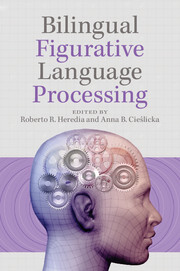Book contents
- Frontmatter
- Dedication
- Contents
- Contributors
- Acknowledgments
- Foreword
- Preface
- Section I Theoretical Implications
- Section II Methodological Approaches
- 4 Metaphoric Reference: A Real-Time Analysis
- 5 Nonliteral Language Processing and Methodological Considerations
- Section III Figurative Language Processing
- Section IV Cross-Linguistic Approaches and Applied Issues
- Author Index
- Subject Index
- References
4 - Metaphoric Reference: A Real-Time Analysis
Published online by Cambridge University Press: 05 February 2015
- Frontmatter
- Dedication
- Contents
- Contributors
- Acknowledgments
- Foreword
- Preface
- Section I Theoretical Implications
- Section II Methodological Approaches
- 4 Metaphoric Reference: A Real-Time Analysis
- 5 Nonliteral Language Processing and Methodological Considerations
- Section III Figurative Language Processing
- Section IV Cross-Linguistic Approaches and Applied Issues
- Author Index
- Subject Index
- References
Summary
Abstract
In two experiments, we examine the processing of metaphoric reference, where a metaphoric description (e.g., creampuff) makes reference to an antecedent describing a cowardly boxer during the online comprehension of spoken sentences. We measured activation levels of figurative (e.g., boxer) and literal (e.g., pastry) interpretations of the metaphoric referential description. Experiment 1 measured meaning activation at 0 ms and 1000 ms after the metaphoric referential description. At the metaphoric reference offset, only activation for the nonliteral interpretation was observed. At 1000 ms only activation for the literal interpretation was evidenced. Experiment 2 involved Spanish-English bilinguals immersed in a bilingual community where usage of both languages is a common occurrence. Meaning activation was measured at 0 ms and 300 ms after metaphoric reference offset. Results revealed that bilinguals were much faster to name targets consistent with a figurative interpretation at 300 ms than at 0 ms after prime offset. The same pattern was observed for the literal target interpretation. Implications for theories of bilingual metaphoric language processing are discussed.
Keywords: anaphoric metaphor, cross-modal lexical priming, bilingual metaphor, referential metaphor, metaphoric reference
As a way to introduce the topic of this chapter, consider sentences (1a-c), below. The metaphoric expression, lawyers are sharks, in sentence (1a) is an example of the more conventionalized nominal metaphor of the form A is B.
Information
- Type
- Chapter
- Information
- Bilingual Figurative Language Processing , pp. 89 - 116Publisher: Cambridge University PressPrint publication year: 2015
References
Accessibility standard: Unknown
Why this information is here
This section outlines the accessibility features of this content - including support for screen readers, full keyboard navigation and high-contrast display options. This may not be relevant for you.Accessibility Information
- 12
- Cited by
